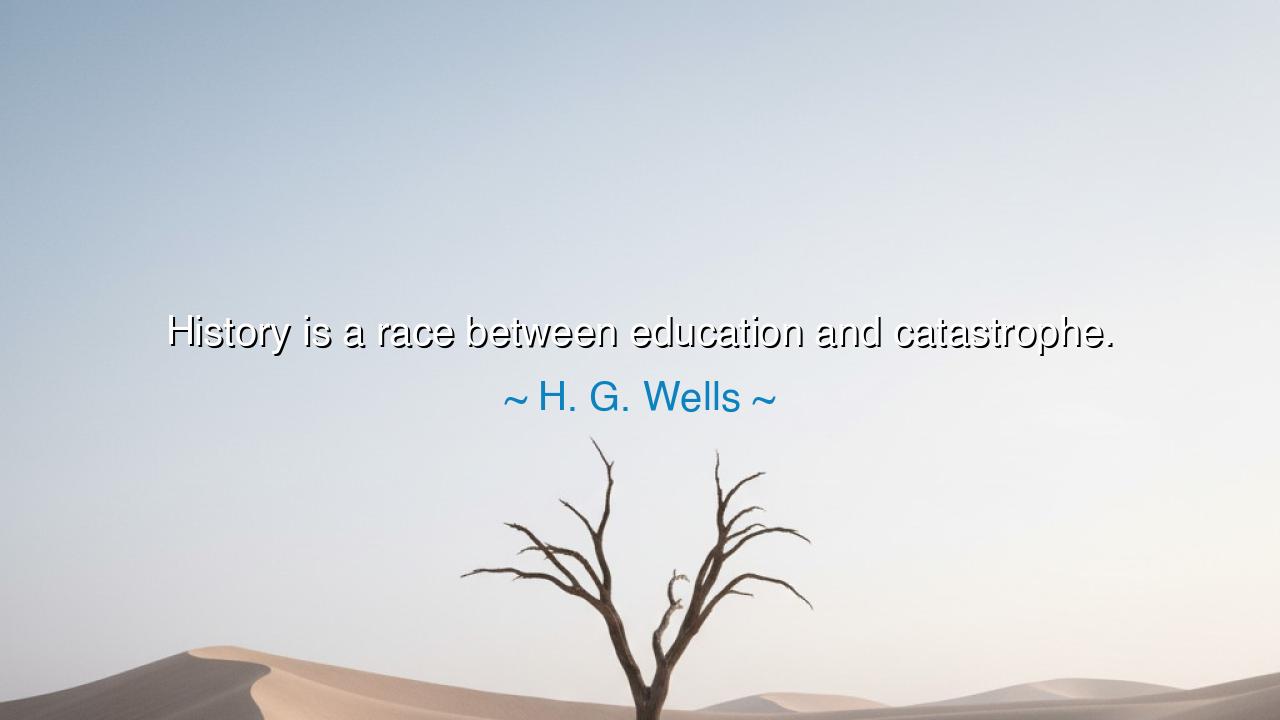
History is a race between education and catastrophe.






The visionary writer and prophet of modern times, H. G. Wells, once proclaimed: “History is a race between education and catastrophe.” These words, sharp as lightning and heavy with warning, are not merely the reflection of a novelist, but the revelation of a man who foresaw both the glory and the ruin of human civilization. Wells, who gazed into the future with a mind both scientific and poetic, understood that the fate of humanity hangs upon a delicate thread — the thread of knowledge. In his view, every generation runs this race anew: will mankind learn in time to use its power wisely, or will ignorance and folly drive it to destruction? The contest is eternal, and its stakes are nothing less than the survival of the world.
The origin of this quote can be traced to Wells’s profound reflections during the first half of the twentieth century, an age trembling between enlightenment and annihilation. The same century that unlocked the atom and mapped the stars also unleashed two world wars, with suffering vast enough to darken the heavens. As a thinker who believed in the potential of science and reason to uplift humanity, Wells feared that knowledge without education, and progress without wisdom, would lead to catastrophe. In his books — from The Outline of History to The Shape of Things to Come — he warned that unless men learned to think beyond greed, nationalism, and ignorance, their very inventions would become the instruments of their ruin. Thus, his quote stands as both prophecy and plea: that education must run faster than the forces of chaos, or civilization will fall to its own shadow.
To understand his meaning, one must see that education, in Wells’s sense, is not merely the learning of facts, but the awakening of conscience. True education is the illumination of the human spirit — the ability to think critically, to empathize deeply, and to act justly. Catastrophe, on the other hand, is not only war or destruction, but the collapse of understanding itself — the triumph of ignorance, hatred, and fear. When knowledge grows without wisdom, when invention outruns morality, catastrophe is not far behind. Thus, Wells saw history not as a steady march forward, but as a perilous race between enlightenment and oblivion.
Consider the story of the atomic bomb — a creation born from the highest reaches of science and the lowest depths of despair. In 1945, the brilliance of human intellect split the atom, and in doing so, split the moral heart of humanity. The same scientific spirit that sought to heal disease and explore the stars also gave birth to weapons that could erase entire cities in an instant. Wells, who had imagined such weapons in his novels long before they existed, understood that mankind had entered a new and dangerous era. The knowledge to destroy now existed — but had humanity gained the education to restrain itself? The answer, he feared, was uncertain.
And yet, there is hope in his warning. For Wells did not write as a cynic, but as a believer in the transformative power of learning. He saw in education the antidote to catastrophe — the one force capable of binding humanity together across borders and generations. To educate is to build bridges instead of walls, to replace fear with understanding, and to train the mind to serve compassion rather than cruelty. Every school, every book, every conversation that awakens thought is a victory in this great race. And every act of ignorance — every lie, every blind hatred — is a step toward disaster. The race continues every day, in every heart that chooses to think rather than to destroy.
History itself bears witness to both sides of this struggle. When ignorance has ruled — in the burning of libraries, the persecution of thinkers, the silencing of truth — darkness has followed. But when education has triumphed — in the Renaissance, in the Enlightenment, in the rise of human rights — humanity has risen toward light. The race is never finished, for knowledge must always renew itself, and ignorance is tireless. Wells’s words remind us that civilization is not an inheritance, but a responsibility — a fire that must be tended, or it will consume us.
Therefore, my children of this age of wonders and perils, remember the warning of H. G. Wells. Do not let catastrophe outrun education. Seek truth not as a luxury, but as the breath of life. Question, learn, teach — for every mind awakened is a shield against destruction. Let your education not be of books alone, but of the soul: learn kindness, justice, and humility alongside science and art. For only when wisdom and knowledge walk hand in hand can the race be won.
And so, the lesson stands, clear and eternal: the future belongs to those who learn faster than they destroy. The race between education and catastrophe continues, and each generation must choose which runner it will strengthen. If we choose knowledge guided by compassion, then history will ascend toward peace. But if we surrender to ignorance, pride, and fear, then history will end — not in glory, but in ruin. The choice is ours, and the race is now.






AAdministratorAdministrator
Welcome, honored guests. Please leave a comment, we will respond soon